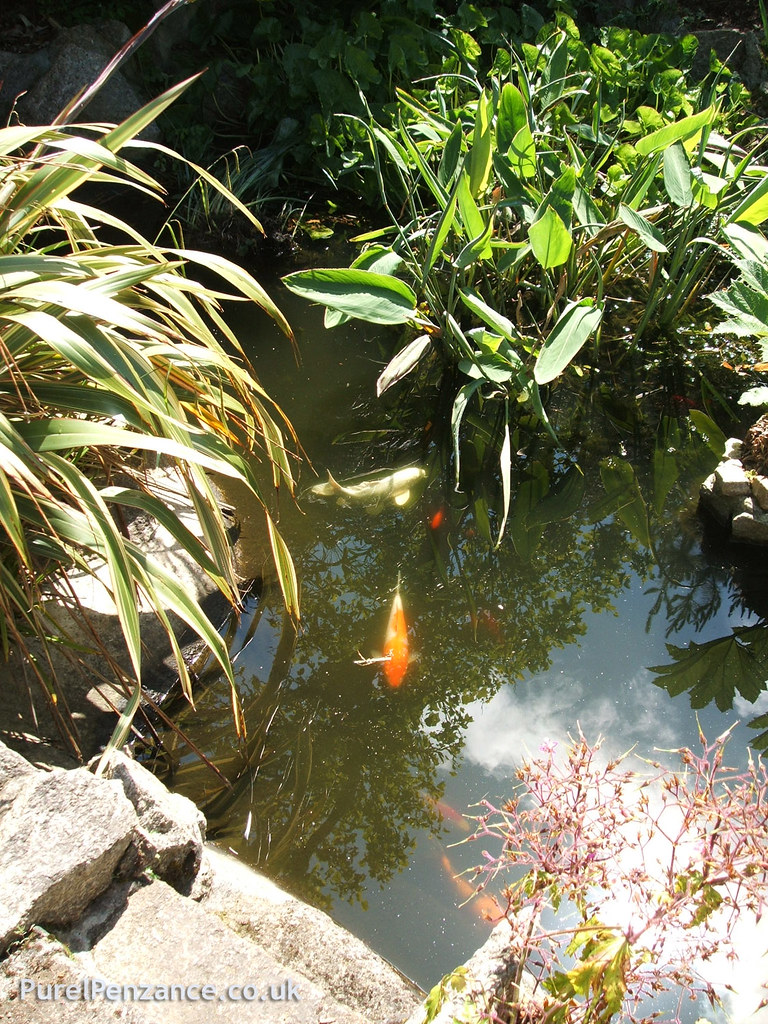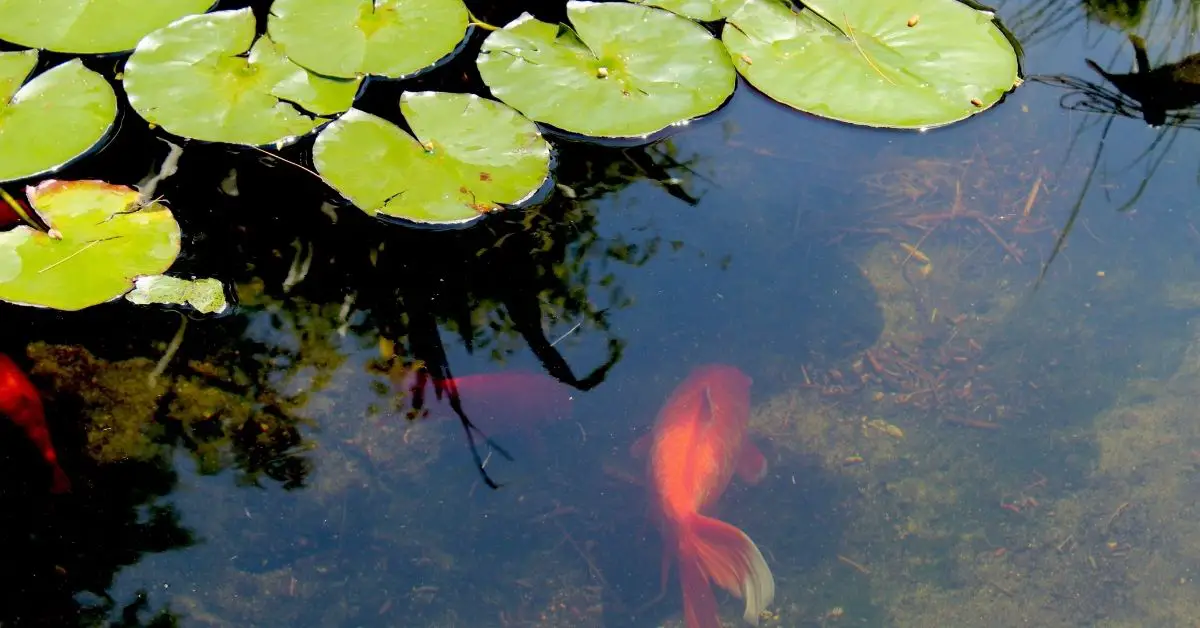One of the most common reasons for fish dying outside of their pond is due to acidic or basic water. Water pH, while not as important as water temperature to a fish’s well-being, can still have an impact on the sensitive skin and respiratory systems. The environment goldfish are accustomed to has very specific pH levels that may be different from those in an average home aquarium. Goldfish may refuse to eat, swim awkwardly, and show signs of stress.
If left untreated, goldfish will become very ill from a pH that is too high or low. The fish will be unable to use the oxygen in the water efficiently and may gasp at the surface for air. Goldfish with severely acidic water may develop fin or tail rot, and bacteria may infect the open sores.

What could be the reasons that your goldfish die outside of the pond?
High pH
In cases of basic water, too much carbon dioxide will be dissolved in the water and can cause fish to suffocate. Nitrogen gas will also rise from the ammonia-rich waste at the bottom, making it difficult for the goldfish to breathe. Goldfish with high pH often suffer from problems similar to those that develop in acidic water, except the sores will be on their bodies and not their tails.
Fish Will Die If They Feel Overcrowded or Overfed
Goldfish produce a lot of waste, and they constantly search for food. Too much of either can overwhelm the water quality in an aquarium. Make sure you are cleaning your tank on a regular basis to remove pollutants that build up from fish activity and uneaten food. If your goldfish are overcrowded or overfed, they will be more likely to exhibit stress behaviors, such as hiding or swimming on their sides.
Faulty pond equipment
If you have purchased the correct filter for your tank size and it is maintained correctly, there is no reason that goldfish should not live outside of the pond for several years. Improper filtration can cause poor water quality issues, so check your filter on a regular basis to ensure that it is working properly. Since you cannot test a fish’s water in the same manner that you can test your own, there are several ways to check if your filter needs cleaning or replacement:
EAST OAK Outdoor Storage Box, 31 Gallon Deck Box Indoor and Outdoor Use, Waterproof Resin Storage Bin for Package Delivery, Patio Cushions, Gardening Tools, Lockable, UV Resistant, Grey
24% OffOLANLY Outdoor Rug Waterproof 5x8 ft, Reversible Outdoor Plastic Straw Rug, Boho Patio Rug, Indoor Outdoor Carpet, RV Mat Outside for Patio, Camp, Picnic, Balcony, Deck, Backyard, Black & White
25% OffSolar Fence Lights Outdoor - 2700/4000/6000K 3 Mode, IP65 Waterproof Fence Solar Lights Outdoor, Solar Deck Lights for Outside, Backyard/Railing/Step/Patio/Deck Fence/Stair Railings and Wall (8 pack)
$42.99 ($5.37 / Count) (as of October 20, 2024 19:14 GMT +03:00 - More infoProduct prices and availability are accurate as of the date/time indicated and are subject to change. Any price and availability information displayed on [relevant Amazon Site(s), as applicable] at the time of purchase will apply to the purchase of this product.)Look for Particulate Matter – Clumps of dirt and other solid objects floating around in the aquarium can mean that the filter is not working properly. Most filters should keep the aquarium water clear of pollutants, but if you find dirt and debris, consider moving your fish into a clean tank with new water. If this does not work, it may be time to replace or rebuild your filtering system.
Toxins in water
Toxins are also a common cause of goldfish death outside the pond. Goldfish may ingest toxins from tap water during feeding time or while eating food that has hit the gravel. Many medications used in aquariums can kill goldfish, so it is important to read product labels carefully before adding anything.
Starvation
For goldfish kept in a pond, the main cause of death will be from starvation and lack of oxygen. Fish need to consume large amounts of food daily – up to five times more than a fish in an aquarium would eat. In addition, their environment is much larger, and they are constantly swimming, causing them to need more oxygen.
Low oxygen
Goldfish kept in a pond with low oxygen will develop an infection that can spread rapidly. Goldfish can survive for a few days without food, but only about 24 hours without oxygen. Since water naturally becomes less saturated with oxygen over time, it is important to check the concentration of oxygen at least once a week.
Jumping out of the pond
Goldfish kept in a pond also have the option of jumping out, which can lead to death. Once a goldfish jumps out of the pond, it is at risk of being eaten by cats, dogs, and other predators. Even if your fish do not jump out of the pond on their own, they may be pushed out by others or have something thrown into the water that frightens them.
If you notice dead goldfish in the garden, you may be tempted to blame the neighborhood cat, but it is actually more likely that your fish has died from a disease. If you notice a few deaths, there may not be much you can do about it, but if several have died over a relatively short amount of time, the problem may lie inside of your pond or garden.
Parasites
Goldfish may be more susceptible to parasites than other fish. Flukes are a common parasite of goldfish kept in ponds, and if the fish is badly infected, it will lose its appetite and start swimming around erratically. If left untreated, the flukes can cause major organ damage as well as lead to death from secondary infections.
Tail rot
Because the skin on a goldfish is thin and sensitive, it can typically be damaged easily from either too much or too little water flow. For this reason, it is important to make sure that your fish are swimming at the ideal level of current for their size. If they swim into rocks or barbed plants, their tail could become damaged or infected.
The biology of a goldfish is similar to other freshwater fish, but they have some special characteristics that make them different from their non-fancy cousins.
Should you remove dead fish from the pond? Your
goldfish’s body can lay on the bottom of the pond for up to 24 hours before it begins to decompose and start to smell. However, you should still remove any dead fish from their surroundings as soon as possible because they begin consuming oxygen when they die. Dead fish may also attract bacteria that will cause a more rapid breakdown of your live fish.
How to dispose of dead goldfish?
To prevent the spread of disease, you should remove any carcasses and bury them at least five feet deep in the garden if you do not have a composting system. If possible, try not to place your dead fish in your trash or flush them down the toilet as they will just end up in the water supply.
Can pond fish die in hot weather?
Summer heat can be difficult for your pond fish to deal with, resulting in several health problems. To keep your fish healthy, you should try to keep the water temperature between 50 and 70 degrees Fahrenheit.
If you notice your fish are acting strangely due to the heat, try adding some ice cubes to their water. If you are worried that your pond may become too hot, consider investing in a pond aerator to help reduce the temperature.
How do fish adjust to winter weather?
Winter can be very hard on goldfish kept outside of their natural environment. For example, the low temperatures and lack of sunlight will cause them to stop eating altogether. If you want to keep your goldfish alive during the winter months, you may need to artificially introduce warmth into your pond. To do this, you can invest in an electric or gas-powered aerator that will warm up the water from below.
Can heavy rain kill fish?
Ponds and bodies of water are built to withstand significant amounts of rain, though it is important to note that flooding can occur if the ground cannot absorb all of the water. Typically after heavy rains, you will find a lot of debris in your pond and the fish may be hiding under rocks or plants.
If you notice that several fish have died after a rainy day, the cause may be that they cannot breathe because of low oxygen levels. You will want to make sure the pond is aerated at this time to help bring more oxygen into the water.
In Summary
Goldfish are interesting creatures with some unique properties that make them different from other freshwater fish. However, they still need to be cared for just like any other pet and can die if not treated properly. In this article, we’ve provided a few tips on how to care for your goldfish so they live long and healthy lives inside the pond.
However, if you plan to keep your goldfish in your backyard pond, there are certain conditions that they may experience. For example, in cold weather conditions, your goldfish can stop eating and many die because of the extreme temperatures. In addition, the summer heat can be harsh on your fish as well. If the waters get too hot or cold, it is best to try and keep both the water temperature as well as the air temperature a little bit cooler for your goldfish.
References:
Common Pond Problems https://extension.okstate.edu/fact-sheets/common-pond-problems.html
Why Are My Pond Fish Dying? https://animals.mom.com/why-are-my-pond-fish-dying-12333600.html




















